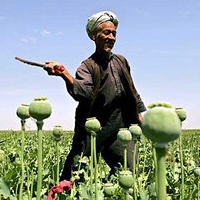Inspector General Warns that with Opium Production Skyrocketing, Afghanistan Could become “a Narco-Criminal State”

The United States’ nation-building effort in Afghanistan could turn out to be a complete failure because of its inability to stem opium production, which has expanded so much that the drug trade may come to dominate the war-torn nation in the coming years.
John Sopko, the special inspector general for Afghanistan reconstruction (SIGAR), painted a bleak picture for Congress this week about the $10 billion investment in Afghanistan’s counternarcotics operations.
“Afghan farmers are growing more opium poppies today than at any time in their modern history,” Sopko told the Senate Caucus on International Narcotics Control. Despite the “mammoth investment” of American dollars and manpower, “more land in Afghanistan is under poppy cultivation today than it was when the United States overthrew the Taliban in 2002.”
This means the Taliban is flush with cash, due to insurgents using the opium trade to finance their war against the U.S. and the Afghan government. The country’s poppy fields are responsible for more than $150 million a year in revenue for Islamic militants, according to James L. Capra, the Drug Enforcement Administration’s chief of operations, who provided written testimony to the caucus.
“The Taliban is involved in taxing opium poppy farmers; operating processing laboratories; moving narcotics; taxing narcotics transporters...[and] providing security to poppy fields, drug labs, and opium bazaars,” Capra said.
Opium is becoming such a powerful force in Afghanistan—which produces 90% of the world supply of this drug—that it could wipe out all of the progress made by the U.S. intervention over the last twelve years.
“In the opinion of almost everyone I spoke with, the situation in Afghanistan is dire with little prospect for improvement in 2014 or beyond,” Sopko said.
“All of the fragile gains we have made over the last twelve years on women’s issues, health, education, rule of law, and governance are now, more than ever, in jeopardy of being wiped out by the narcotics trade which not only supports the insurgency, but also feeds organized crime and corruption,” he added.
The head of SIGAR concluded his testimony with this ominous warning:
“The people I spoke with in Afghanistan in my last few trips talked about two possible outcomes following the 2014 transition in Afghanistan: a successful modern state, or an insurgent state. However, there is a third possibility: a narco-criminal state. Absent effective counternarcotics programs and Afghan political will to seriously tackle this grave problem, that third outcome may become a reality.”
-Noel Brinkerhoff
To Learn More:
Future U.S. Counternarcotics Efforts in Afghanistan (Special Inspector General for Afghanistan Reconstruction) (pdf)
The Looming Narco-State in Afghanistan (by D.B. Grady, The Atlantic)
Afghanistan's Narcotics Problems Grow Worse (by R. Jeffrey Smith and Mattie Quinn, Center for Public Integrity)
- Top Stories
- Unusual News
- Where is the Money Going?
- Controversies
- U.S. and the World
- Appointments and Resignations
- Latest News
- Trump to Stop Deportations If…
- Trump Denounces World Series
- What If China Invaded the United States?
- Donald Trump Has a Mental Health Problem and It Has a Name
- Trump Goes on Renaming Frenzy






Comments